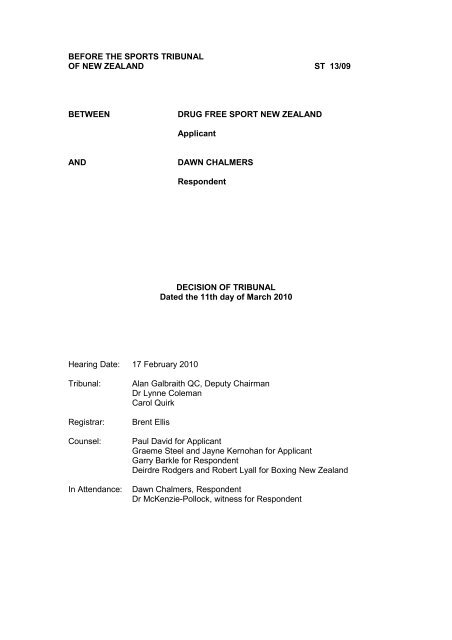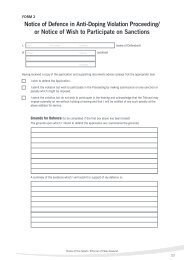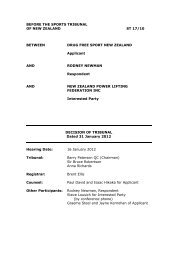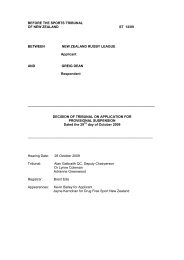dawn chalmers - Sports Tribunal of New Zealand
dawn chalmers - Sports Tribunal of New Zealand
dawn chalmers - Sports Tribunal of New Zealand
You also want an ePaper? Increase the reach of your titles
YUMPU automatically turns print PDFs into web optimized ePapers that Google loves.
BEFORE THE SPORTS TRIBUNAL<br />
OF NEW ZEALAND ST 13/09<br />
BETWEEN DRUG FREE SPORT NEW ZEALAND<br />
Applicant<br />
AND DAWN CHALMERS<br />
Hearing Date: 17 February 2010<br />
Respondent<br />
DECISION OF TRIBUNAL<br />
Dated the 11th day <strong>of</strong> March 2010<br />
<strong>Tribunal</strong>: Alan Galbraith QC, Deputy Chairman<br />
Dr Lynne Coleman<br />
Carol Quirk<br />
Registrar: Brent Ellis<br />
Counsel: Paul David for Applicant<br />
Graeme Steel and Jayne Kernohan for Applicant<br />
Garry Barkle for Respondent<br />
Deirdre Rodgers and Robert Lyall for Boxing <strong>New</strong> <strong>Zealand</strong><br />
In Attendance: Dawn Chalmers, Respondent<br />
Dr McKenzie-Pollock, witness for Respondent
Introduction<br />
2<br />
1. The facts <strong>of</strong> the present case have caused the <strong>Tribunal</strong> some anxious<br />
consideration.<br />
2. The facts raise concerns beyond the direct implication for Ms Chalmers’<br />
circumstances about the failure <strong>of</strong> athletes and their medical advisors to take<br />
advantage <strong>of</strong> the information access provided by Drug Free Sport <strong>New</strong><br />
<strong>Zealand</strong> and an additional concern about the adequacy <strong>of</strong> medical advice<br />
provided to women athletes.<br />
3. These are not matters that can be dealt with directly in this decision but this<br />
The facts<br />
Panel will be referring those matters to general consideration by the <strong>Tribunal</strong>.<br />
4. Dawn Chalmers is a practising physiotherapist with a substantial sporting<br />
background as a <strong>New</strong> <strong>Zealand</strong> representative in water polo and an Otago<br />
representative in surf lifesaving and basketball. Since 2003 she has achieved<br />
such success in women’s boxing that she is a potential candidate for the 2012<br />
Olympic Games.<br />
5. On 10 October 2009 she was tested after winning her division at the <strong>New</strong><br />
<strong>Zealand</strong> Boxing Championships. The result was a positive test to<br />
Furosemide. Ms Chalmers was advised <strong>of</strong> this on 4 November and wrote to<br />
Mr Steel at Drug Free Sport <strong>New</strong> <strong>Zealand</strong> on 6 November accepting the result<br />
and detailing the circumstances in which she had come to take a Furosemide<br />
tablet two days prior to her bout at the Championships.<br />
6. We do not find it necessary to repeat the detail <strong>of</strong> her medical condition which<br />
led to her doctor, Dr McKenzie-Pollock, prescribing Furosemide other than to<br />
say it was to mitigate difficulties with swelling and pain that Ms Chalmers had<br />
suffered from for several years associated with menstruation.<br />
7. The evidence <strong>of</strong> Dr McKenzie-Pollock was that he had been Ms Chalmers’<br />
medical practitioner for some time, she had consulted him about this particular<br />
problem and he had judged it clinically appropriate to prescribe Furosemide.<br />
When doing so he was aware <strong>of</strong> her boxing involvement and he had told her
3<br />
not to take the Furosemide “close to” or “around” competition.<br />
Dr McKenzie-Pollock is an experienced sports medicine practitioner.<br />
8. Ms Chalmers’ evidence was that she accepted this advice from her doctor,<br />
confirmed it with her pharmacist, but did not take any steps to check this<br />
advice with Drug Free Sport <strong>New</strong> <strong>Zealand</strong> or to clarify what were the<br />
parameters <strong>of</strong> “close to” or “around” competition. Had she done so she would<br />
have been told that Furosemide is a specified substance not to be taken in or<br />
out <strong>of</strong> competition unless the athlete has obtained a therapeutic use<br />
exemption (TUE).<br />
9. One <strong>of</strong> the concerns which the <strong>Tribunal</strong> has had is that Furosemide is a<br />
substance which is capable both <strong>of</strong> enhancing performance by reducing fluid<br />
retention and hence weight which may be vital in a weight restricted<br />
competition; and also is capable <strong>of</strong> masking other substances such as<br />
steroids. Given that there are other possible treatments for Ms Chalmers’<br />
problem there is no certainty that if a TUE had been sought it would have in<br />
fact been granted.<br />
10. Ms Chalmers’ evidence was categoric that her approach to<br />
Dr McKenzie-Pollock was not prompted by any intention to enhance her<br />
sporting performance but solely to deal with what had become a persistent<br />
lifestyle problem. Her evidence was that she had never had a problem<br />
meeting any <strong>of</strong> the weight classes in which she had competed. Ms Chalmers<br />
was tested on this evidence by Mr David in cross-examination.<br />
11. Dr McKenzie-Pollock’s evidence was that he assessed that it was clinically<br />
appropriate to prescribe Furosemide to mitigate Ms Chalmers condition.<br />
Obviously Dr McKenzie-Pollock understood the potential for Furosemide to be<br />
used for improper purposes and would not have prescribed it had he had any<br />
concerns that Ms Chalmers was seeking it for other than its therapeutic<br />
benefit.<br />
12. Ms Chalmers’ evidence confirmed that she was in the registered testing pool<br />
<strong>of</strong> athletes and had been tested for the presence <strong>of</strong> prohibited substances on<br />
a number <strong>of</strong> occasions, both in and out <strong>of</strong> competition. She accepted that she<br />
had signed a form acknowledging that she understood her responsibilities as<br />
an athlete in the anti-doping programme and also that she had received from<br />
Drug Free Sport <strong>New</strong> <strong>Zealand</strong> a wallet guide and athlete handbook. She also
4<br />
accepted that she had the principal responsibility to ensure that she did not<br />
take any substance which infringed the Code and that she had failed in her<br />
obligations in not checking with Drug Free Sport <strong>New</strong> <strong>Zealand</strong> the status <strong>of</strong><br />
Furosemide.<br />
<strong>Sports</strong> anti-doping rules<br />
13. Furosemide is a prohibited substance at all times in and out <strong>of</strong> competition<br />
under the World Anti-Doping Agency (WADA) Prohibited List – Diuretics and<br />
Masking Agents. The relevant anti-doping rules at the time <strong>of</strong> the violation in<br />
this case were the <strong>Sports</strong> Anti-Doping Rules 2009 (SADR) which Boxing <strong>New</strong><br />
<strong>Zealand</strong> had adopted as their anti-doping rules. The WADA Prohibited List is<br />
incorporated into the SADR - see SADR 5.1. The standard period <strong>of</strong><br />
ineligibility arising from a positive test for Furosemide is two years under<br />
SADR 14.2. However, Furosemide is a specified substance under the terms<br />
<strong>of</strong> the Prohibited List. This means that the athlete may be able to reduce or<br />
eliminate the period <strong>of</strong> ineligibility under the specific circumstances under<br />
SADR 14.4.<br />
14. In order to rely on SADR 14.4, the athlete will have to establish:<br />
(a) How the substance entered her body;<br />
(b) That the use <strong>of</strong> the substance was not intended to enhance the athlete’s<br />
sport performance or mask the use <strong>of</strong> a performance enhancing<br />
substance.<br />
15. It is necessary for the athlete to produce corroborating evidence sufficient to<br />
satisfy the <strong>Tribunal</strong> to the standard <strong>of</strong> comfortable satisfaction <strong>of</strong> the absence<br />
<strong>of</strong> an intent to enhance performance or mask the use <strong>of</strong> a performance<br />
enhancing substance.<br />
16. If the <strong>Tribunal</strong> is not comfortably satisfied then the two year period <strong>of</strong><br />
ineligibility applies. If the athlete does satisfy the <strong>Tribunal</strong> then the <strong>Tribunal</strong><br />
has to assess the athlete’s degree <strong>of</strong> default.<br />
Relevant precedents<br />
17. Mr David, as counsel for Drug Free Sport <strong>New</strong> <strong>Zealand</strong>, referred the <strong>Tribunal</strong><br />
to a number <strong>of</strong> decisions both <strong>of</strong> the <strong>Tribunal</strong> and overseas tribunals. In
5<br />
particular he referred to the <strong>New</strong> <strong>Zealand</strong> decisions in Drug Free Sport <strong>New</strong><br />
<strong>Zealand</strong> v Dane Boswell (ST 01/09, decision 12 February 2009) and Drug<br />
Free Sport <strong>New</strong> <strong>Zealand</strong> v Tom (Zig Zag) Wallace (ST 15/08, decision 5<br />
March 2009) and to the UK decision in The Anti-Doping Commission <strong>of</strong> the<br />
International Boxing Association v Jade Mellor (decision 16 November<br />
2009). The latter case arose in circumstances in which a female boxer took a<br />
diuretic in order to bring herself within a weight division. Mr Barkle for Ms<br />
Chalmers also made submissions in respect to the relevance <strong>of</strong> these three<br />
cases.<br />
18. Inevitably there are differences in the facts <strong>of</strong> those cases from those in the<br />
Decision<br />
present case. In Boswell a young rower failed to tell the accident and<br />
emergency doctor that he was a carded athlete and was prescribed a<br />
treatment which resulted in a positive test. The <strong>Tribunal</strong> considered a<br />
suspension <strong>of</strong> three months would normally be appropriate but for reasons<br />
relating to the specific circumstances <strong>of</strong> that case (particularly around the<br />
athlete not having been previously provisionally suspended but having not<br />
competed for a month) the <strong>Tribunal</strong> imposed a suspension <strong>of</strong> two months. In<br />
Wallace a young athlete inquired whether a prescribed drug would cause him<br />
any problems in relation to drug testing and was wrongly told by the doctor<br />
that the drug was not prohibited. While this did not absolve the athlete <strong>of</strong> his<br />
responsibilities to further check the status <strong>of</strong> prescribed medication, the<br />
<strong>Tribunal</strong> considered that a warning and reprimand was an appropriate<br />
sanction in these circumstances. In Mellor the UK tribunal’s finding was that<br />
the substance was taken for the purpose <strong>of</strong> bringing the athlete within a<br />
weight class and she could not establish to the required standard that her<br />
taking <strong>of</strong> the substance was not intended to enhance her sports performance.<br />
As a consequence, she was suspended for the mandatory period <strong>of</strong> two<br />
years.<br />
19. The <strong>Tribunal</strong> accepts the evidence <strong>of</strong> Ms Chalmers and Dr McKenzie-Pollock<br />
that the prescribing <strong>of</strong> Furosemide and its use by Ms Chalmers on this<br />
occasion was for therapeutic purposes and not for the purpose <strong>of</strong> enhancing<br />
performance, bringing Ms Chalmers within a weight class, or masking the use<br />
<strong>of</strong> any other prohibited substance.
6<br />
20. In the present case assessing the degree <strong>of</strong> Ms Chalmers’ fault and an<br />
appropriate penalty has caused this <strong>Tribunal</strong> some anxiety. Mr David’s<br />
submission on behalf <strong>of</strong> Drug Free Sport <strong>New</strong> <strong>Zealand</strong> was that this was a<br />
more serious case than Boswell. We agree with that submission.<br />
21. The reasons we have come to that conclusion are:<br />
(a) Ms Chalmers was a senior athlete with knowledge <strong>of</strong> her obligations and<br />
experience <strong>of</strong> the testing programme.<br />
(b) As she acknowledged, she had a Drug Free Sport <strong>New</strong> <strong>Zealand</strong> Wallet<br />
Guide and athlete handbook and ready access to the information<br />
services which Drug Free Sport provides.<br />
(c) While Dr McKenzie-Pollock had misstated the status <strong>of</strong> Furosemide she<br />
had at least been explicitly alerted that Furosemide was a substance not<br />
to be taken “close to” or “around” competition.<br />
(d) She acknowledged the logic that as Furosemide reduced fluid retention<br />
it would reduce weight and could have performance consequences.<br />
(e) Despite the uncertainty surrounding Dr McKenzie-Pollock’s caution she<br />
did nothing to clarify the parameters <strong>of</strong> “close to” or “around” which<br />
created the potential for a problem even if the substance had been only<br />
banned in competition.<br />
22. On the positive side we have taken into account Ms Chalmers’ openness and<br />
prompt admission <strong>of</strong> fault, the fact that she obviously knew that she was likely<br />
to be tested if she won her division at the Championships, and that she had<br />
received mistaken advice from both Dr McKenzie-Pollock and her pharmacist.<br />
Those are ameliorating considerations.<br />
23. However, as we have said we regard the facts as more serious than Boswell<br />
because <strong>of</strong> Ms Chalmers’ explicit knowledge that there was an issue about<br />
Furosemide and her failure to clarify the position.<br />
24. Ms Chalmers was provisionally suspended as from 21 December 2009.<br />
Accordingly by the date <strong>of</strong> our hearing on 17 February 2010 she had already<br />
been suspended for almost two months. In the circumstances we impose a
7<br />
further period <strong>of</strong> ineligibility <strong>of</strong> three months commencing on 17 February 2010<br />
until the night <strong>of</strong> 16 May 2010.<br />
25. Although we understand that Ms Chalmers’ sporting focus is solely on boxing<br />
at the moment we do note for completeness that the ineligibility is to have<br />
cross-sport effect.<br />
Dated this 11th day <strong>of</strong> March 2010<br />
_____________________________<br />
Alan Galbraith QC, (Deputy Chairperson for <strong>Sports</strong> <strong>Tribunal</strong>)<br />
Dr Lynne Coleman<br />
Carol Quirk





